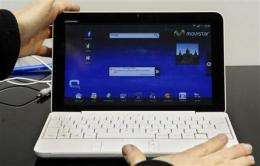Tablets, smartbooks aim to fill PC-phone gap

(AP) -- If you've got a car and a bicycle, do you need a motorcycle too? Wireless carriers are betting that you do. They're making a big push this year for the motorcycles of the gadget world: devices that are bigger than a phone but smaller than a laptop.
The most famous entrant in the category is Apple Inc.'s iPad, which comes out next month. But many other manufacturers are crowding into the niche, and were planning to do so even before Apple's announcement in January.
Some of them are making keyboard-less "tablet" computers in the vein of the iPad. Others are making small laptop-like things known as "smartbooks" that will sell for a few hundred dollars.
Hewlett-Packard Co. showed its first smartbook this week in Barcelona at Mobile World Congress, the world's largest cell phone trade show. At first glance, HP's Compaq AirLife 100 looks just like a netbook - a small laptop - but the inner workings are quite different.
Rather than using Microsoft Corp.'s Windows software, the smartbook runs Android, which Google Inc. created for mobile devices and gives away for free. Rather than using a computer processor from Intel Corp. or Advanced Micro Devices Inc., the AirLife uses a chip from Qualcomm Inc. that has cell phone heritage.
The AirLife works somewhat like a cell phone as well: It's ready to use as soon as you flip the lid open. Like a phone, it receives your e-mail even when it's in standby mode with the lid closed. Because the Qualcomm chip uses a lot less power than a PC chip, HP says the AirLife can be used for 12 hours between charging.
Smartbooks are like cell phones in another way: Wireless carriers will sell them. Spain's Telefonica will sell the AirLife in Europe and Latin America sometime this spring. There are no plans for a U.S. launch, but HP competitor Lenovo Group has revealed a very similar device, the Skylight, which AT&T Inc. will carry in the U.S. (AT&T will also provide wireless broadband service for the iPad.)
The carriers will sell smartbooks because the devices have built-in modems for Internet access on cellular networks. That means they'll usually come with a monthly service fee, in exchange for which carriers will subsidize the purchase prices, perhaps in the $200 to $400 range. (AT&T and Telefonica have not announced their prices yet.)
Dell Inc. is using the same technology - Android software running on a Qualcomm chip - for a tablet computer with a touch screen that is 5 inches on the diagonal. An iPhone screen is 3.5 inches, so the Mini 5 is reminiscent of a big iPhone. It's set to be released in the U.S. later this year.
Freescale Semiconductor Inc. was at the show to demonstrate the types of "in-between" devices that can be made using its chips, including a prototype tablet that slides into a docking station with a keyboard. It also showed the "Qooq," a French tablet designed to show recipes in the kitchen, for things like "les cupcakes."
"There's definitely a space between handsets and laptops, and I think it's great for us that Apple has validated that space, as well as HP," said Freescale spokesman Steve Sperle.
Chip maker Nvidia Corp. brought six tablets and two smartbooks running its chips. They're made by Asian manufacturers that are largely unknown to the public, and the idea is that they'll be sold by wireless carriers, said spokesman Shawn Adamek.
The world's largest maker of PC processors, Intel Corp., doesn't want to be left out of the new market either. It has talked for a few years about getting its chips into "mobile Internet devices," and that ambition seems to be coming to fruition at last. However, cell phone-style chips such as ones made by Nvidia, Freescale and Qualcomm still have the advantage of using less power, yielding longer battery lives.
At the show, OpenPeak Inc., a maker of "white label" devices that are rebranded by other companies, showed off a 7-inch tablet computer running Intel's new "Moorestown" chip. It's expected to ship in the second half of the year.
While there will be a lot of hardware to choose from, the software for smartbooks and tablets needs work. The PC version of Windows doesn't work on cell phone-style chips, and in any case, isn't designed for small screens. So manufacturers are mostly turning to Android. But Google didn't intend Android to run on screens that are bigger than cell phones. Google doesn't allow Android's online library of applications, the equivalent of the iPhone's App Store, to be accessed from smartbooks because it fears the applications won't work well on large screens.
NPD analyst Ross Rubin noted that smartbooks could struggle because it's not clear that consumers will take to devices that look like laptops but don't run Windows. The first generation of netbooks ran the Linux operating system, and the category didn't really take off until they started running Windows. And while smartbooks will be cheap because they'll be subsidized by wireless carriers, the carriers will be selling Windows-based netbooks as well, Rubin said.
When it comes to tablets like Dell's Mini 5, people will have to be enticed to carry a gadget in addition to their cell phone. The concept is reminiscent of the "personal digital assistants" of the '90s and early 2000s. They never became mainstream - until their functions were combined with the phone to create the "smart" phone.
Much likely rides on Apple here. If the iPad is a success, that will probably set the mold for other "motorcycle" devices, much like the iPhone has defined the smart phone.
©2010 The Associated Press. All rights reserved. This material may not be published, broadcast, rewritten or redistributed.




















